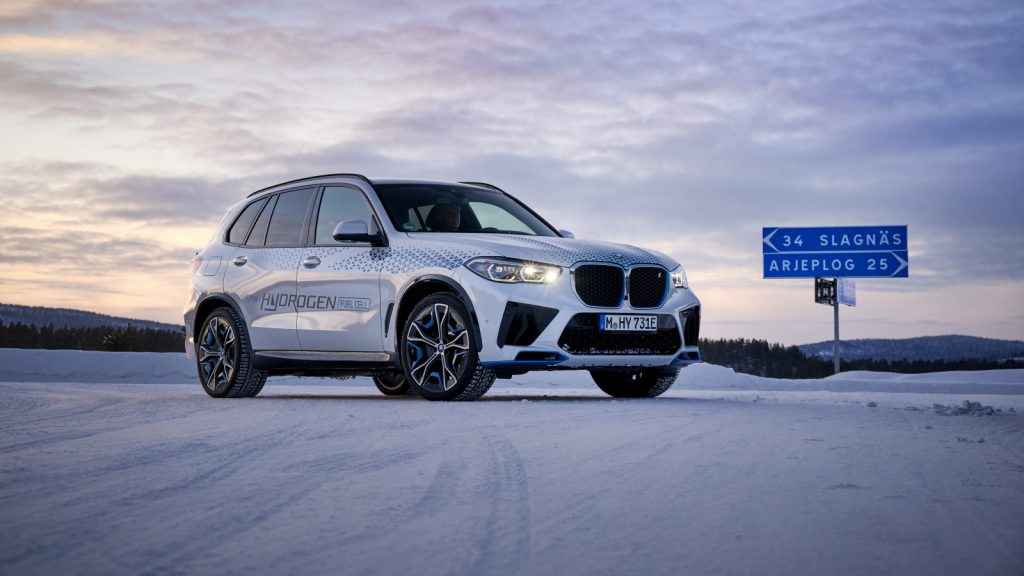The fun thing about making a big prognostication on the Internet is that everyone can easily find it and toss it back in your face if you’re incorrect. I’ve been wrong before and I know it’s usually not fatal, so let me start this Friday episode of The Morning Dump with a big swing: American gasoline consumption has peaked and we’re probably never going back.
There’s a big report out making the case for peak gasoline consumption (which is different from overall energy consumption) and it seems reasonable to me. If there’s anything that is going to hold us back it’s car sales as our fleet ages and people aren’t buying as many new cars as the market would expect.
I say this even though Toyota came out earlier today in Japan and said that it expects to sell way fewer EVs than initially predicted. BMW would likely agree with me on U.S. oil consumption, though partially because it thinks hydrogen cars are going to be a thing. I’m skeptical but, again, I’ve been wrong before.
The Case For Peak Gasoline

Right off the bat, let me clarify that there’s a difference between peak oil and peak gasoline consumption. While it’s possible we’ll globally hit peak oil as soon as 2030, petroleum products are used for a wide variety of activities including power generation, aviation, and marine activity.
What I’m talking about is America’s use of the finished petroleum product known as gasoline, which is what most of us use to power our non-electric cars. Americans love using gasoline, and we’ve historically been in a pattern where we ended up using more of it every year.
There are a lot of factors that contribute to this, and it’s worth taking them individually so we can see why many experts think we’ve already hit the roof. First, let’s take the things that contribute to gasoline consumption going up:
- More cars (i.e., more cars per capita).
- More people (i.e. population growth)
- More vehicle miles traveled (i.e. people driving more or longer distances)
- Less efficient vehicles being purchased
- People having more money (thus traveling more and buying bigger, less efficient cars)
This is the way it worked, generally, for many years. Specifically, as the Gross Domestic Product (GDP, which is one way to measure the economy) went upwards you’d expect people to drive more and get that bigger Cadillac or trade up from a Chevy Malibu to a Chevy Suburban.
I would argue that this pattern is broken, and I’ll go back to 1970, basically, to show this
Let’s start with the easy one: There are more people now than in 1970. According to the Census Bureau, there were about 203 million people in America in 1970 and there were about 330 million people in 2020. Some are miserable, some are happy, but most of them drive cars.
Population growth stalled a bit during the pandemic (it seems to be coming back), but we can assume there are going to be more people in 2030 than now unless something terrible happens.
If all other things were equal, that would mean we would use more gasoline every year and, for the most part, that’s happened (with some variance for economic activity and that one giant global pandemic). But gasoline consumption peaked in 2018 at 392 million gallons per day in 2018 according to the U.S. EIA. Again, it moves up and down a little, but why wouldn’t it keep moving up over the long term?
Car ownership has gone up since 1970 of course, with there being an average of 545 vehicles per 1,000 people in America back then. Today, it’s somewhere closer to around 830-840, depending on whom you ask. This number has been fairly stable or, even, has dropped since the early aughts. It’s possible this number goes up, but with car sales declining my guess is it’ll level off a bit or even go down.

GDP? I mean, who really knows, right? My guess is it’ll mostly go up, but I cannot prove that. If it goes down then there’s an even bigger case for peak gasoline.
Ok, so what about vehicle miles traveled? Here’s a handy chart showing that those peaked around 2019, dropped during the pandemic, and have since rebounded. Will this figure continue to rise? Possibly. I’m going to assume it will.
So: GDP is going up, there are more people, and even if those people travel the same amount as everyone else, on average, the fact that there are more people (and roughly the same number of cars per 1,000 people) means more vehicle miles traveled, which means more gasoline consumption.
Except, as mentioned above, that’s not necessarily happening. The reason is pretty simple: When people have more money they buy newer cars, which are often more efficient cars, oftentimes even if those cars are bigger. And it doesn’t seem to matter if it’s a hybrid, an EV, or just a regular car with a smaller turbo motor, the trade-up factor is completely broken and has been for a while.
Below is a chart from the U.S. Department of Energy that is my absolute favorite way to visualize this:
That shows the average fuel economy of the U.S. fleet in MPG and the average amount of power a vehicle has as measured in peak horsepower. The Malaise Era truly sucked and you can see that power got way worse, which made fuel economy better, but generally made everyone else miserable.
Automakers figured out how to squeeze more power out of cars without using a ton more gasoline, but fuel economy (on average) didn’t improve all that much. This came to a head in the Bush Administration. You can credit high gas prices or, maybe, Al Gore and “An Inconvenient Truth,” or the Toyota Prius, Elon Musk, or whatever you want, but people suddenly decided they still wanted bigger SUVs, they just didn’t want them to use as much fuel.
To the credit of the auto industry, which is often blamed for making the environment worse, they’ve collectively done a pretty kick-ass job of getting people into bigger/nicer/safer cars that are waaaaaay more efficient. Some credit also goes to the government, which has increasingly mandated cars to be better for the environment. There’s always a lot of bitchin’ and moanin’ about increased fuel economy standards, but we are in a Have Your Cake And Eat It moment.
Cars are more powerful. They’re bigger. They’re safer. They’re generally nicer. And they’re almost all more efficient. I also think they’ll continue to get more efficient as corporate average fuel economy standards get more stringent:
Let’s assume that the industry is right and this is too hard and people don’t buy as many EVs, blah blah blah, I think the huge increase in popularity of hybrids and PHEVs means that consumer behavior is fundamentally changing.
And I’m not alone! There’s a big Bloomberg Opinion piece this week laying out basically the same arguments and seems to come to the same conclusion that it would be hard to reverse this trend:
The recent slowdown in sales of EVs and the potential election of another Trump administration inclined to make tailpipes great again could conceivably curb efficiency gains. Given the economic and demographic headwinds, however, they would have to slow to a stop or even reverse in order to get back to 2018 demand levels sometime this decade. And while legacy automakers in the US have scaled back targets for battery electric vehicles, enthusiasm for plug-in hybrids has risen, which is still bullish for efficiency and bearish for gasoline.
On any reasonable view, US gasoline demand, accounting for one in every 12 barrels of oil consumed worldwide, has peaked.
With credit to economists like Philip Verleger, who noted this inversion between per capita economic growth and fuel consumption years ago, I just don’t see how we’re ever going back.
It Would Be Nice If More People Bought Cars
It was mostly a good month for car sales, though it depends a lot on who you are. If you’re a company selling a lot of hybrids and crossovers you’re probably doing just fine. If you have a more traditional lineup it might have been a little tougher, though the lack of monthly sales reports from many automakers is making it harder to see.
Still, the seasonally adjusted annual selling rate (SAAR) was down according to Automotive News:
Deliveries rose 13 percent to 796,555 vehicles among the seven automakers that report monthly U.S. sales results, according to the Automotive News Research & Data Center. The rest of the industry reports on a quarterly basis.
Despite gains posted by those seven companies, the U.S. adjusted sales rate, or SAAR, fell to 15.1 million in August compared with 16.0 million in July and 15.5 million in August 2023, according to Motor Intelligence. The SAAR was forecast to reach 15.2 million to 15.4 million, according to previous estimates. The SAAR has remained above 15 million since January.
[…]
“New vehicle affordability remains the biggest obstacle preventing further advances in the pace of auto sales,” said Chris Hopson, principal analyst at S&P Global Mobility. “The current environment of still-high interest rates and slow-to-recede vehicle prices are translating to still-high monthly payments and little progress for new-vehicle demand.”
Thinking about our first story, this is one of those counter-intuitive things where it would be better for the economy and for the environment if everyone went out and replaced their aging cars with newer hybrids that are much more efficient.
My rough guess is that the Fed cuts by 50 bps in September and, by November we see much better financing deals from automakers so spur a strong end to the year, but that doesn’t take into account more soft jobs reports or a weird election result.
Toyota Cutting Global EV Forecast Production By 30%
Toyota thinks it’s going to make a million electric vehicles in 2026, which is a massive increase over the roughly 150-200k it’s going to sell this year. Still, that number is way down from its initial plan.
Toyota Motor plans to significantly slow its production of electric vehicles, cutting its global output forecast for 2026 to 1 million cars, some 30% lower than the previously announced sales forecast for the same year, Nikkei has learned.
The Japanese automaker’s decision to cut EV production was prompted by the slowdown in the global EV market. Toyota has notified its parts suppliers of the decision.
Under the new plan, Toyota aims to produce a little more than 400,000 EVs in 2025 and to more than double production the following year.
This seems reasonable given current EV demand projections. Toyota is the worldwide leader in hybrids and should be mostly hybrid/EV by 2026.
BMW Is Still Doing Hydrogen Cars

I keep writing this story and I’m surprised every time. Maybe America has reached peak gasoline consumption because people will buy hydrogen cars! (I don’t think they will).
BMW aims to bring its first hydrogen-powered vehicle onto the market in 2028, using fuel cell technology developed with Toyota Motor Corp, the German carmaker said on Thursday.
The company said the vehicle would be an existing model with a hydrogen fuel cell drive option, without giving further details. It also did not give details on price or production volume.
BMW CEO Oliver Zipse said in a statement the vehicle would “highlight how technological progress is shaping the mobility of the future.”
Sure, why not? What do I know?
What I’m Listening To While Writing TMD
It’s “Range Life” from Pavement. Get it? Range life? I can’t wait for the new Pavement movie, man. I’m old.
The Big Question
How wrong am I?















I am super interested to figure out what the Hydrogen diehards (looking at the largest automaker in the world) know that we don’t. On paper H2 makes lots of sense to me from an energy equation standpoint. Batteries are not a long term global solution, just a transition to kickstart a different propulsion era.
Anyone can chime in here? how do we produce, transport, store hydrogen without blowing ourselves up? There are quite a lot of uber smart people who see a way.
Don’t transport. Your gas station takes power and water and makes H2. But I don’t get how they plan to get decent range in a car, the energy density of H2 is terrible.
Nope, energy density is much better than gasoline per weight. If by volume it’s still a little better.
That’s assuming the hydrogen gas is compressed in order to be transported and stored in a vehicle. That takes a great deal of energy which is something that’s not required for EVs. Let’s also not forget the energy lost in the fuel cell in the vehicle.
I’m not sure how hydrogen makes sense from an energy standpoint. There are three separate major steps in bringing hydrogen to vehicles where energy must be added (i.e., where energy is lost – which adds cost directly to the hydrogen people buy).
1. Energy required to make hydrogen gas from water. Ideally, this energy comes from solar or wind or some other green form. (Why are we still considering building a massive energy infrastructure where water consumption is a major factor. It’s insane.)
2. Energy to compress the gas into a storable and transportable form.
3. Energy lost by vehicle fuel cell inefficiency.
Why not just take all of this lost energy and inject into the grid (which is about 93 to 95% efficient) where it’s usable by nearly anyone? I do understand that all-EVs require much bigger batteries which has an energy and pollution and labor cost, but we know these costs aren’t nearly as high over the life of the vehicle as the energy costs for hydrogen fuel.
We all know the severe downsides and yes, we’re only talking about liquefied H2. My question was what makes smart industrial conglomerates think it could work / i.e. overcome your points below? I want the secret recipe. No one?
Yes, I don’t understand why the smart people are putting time and energy into developing prototypes and into promoting it all. Are they expecting government subsidies to last forever and be endlessly lucrative? Are they somehow trying to stall the EV market so they have a chance to catch up (that seems really cynical and doomed to failure)?
I just don’t get it either.
I’m not seeing a citation for those two charts with the black background, so I’m going to assume they were made in-house. To whoever made those charts: please, I beg of you, find and read ANY book on data visualization. Grey text on a black background with a tiny font size makes the scale of those charts almost unreadable. If you’re looking for a recommendation, I liked “Storytelling with Data” by Knaflic. “How Charts Lie” by Cairo is also good.
I had to magnify this page by 50%
Sorry, that’s DOT, not us.
I have nothing to add other than I was scrolling quickly through the home page and thought this article said “Americans have Reached Peak Constipation.”
On TMD, no less! That would be a crappy take, wouldn’t it!